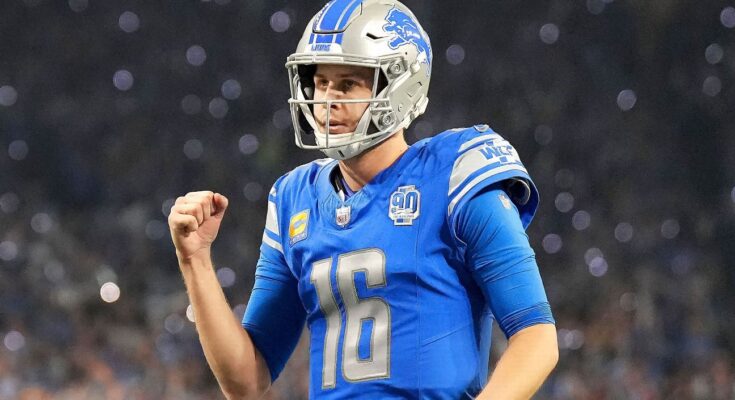The betrayal that ignited Jared Goff’s rise into superstardom and transformed him into the fearless leader of the Detroit Lions’ high-powered offense.
Jared Goff’s NFL journey has been anything but smooth. Drafted first overall by the Los Angeles Rams in 2016, Goff entered the league with sky-high expectations. He was supposed to be the golden-armed savior of a franchise starving for a franchise quarterback. But just a few years after leading the Rams to the Super Bowl, Goff was unceremoniously shipped out of Los Angeles. Many saw it as a betrayal. Goff had delivered results. He had fought through a disastrous rookie season, helped turn the Rams into contenders under Sean McVay, and played a pivotal role in a postseason run that nearly brought Los Angeles its first Super Bowl title since the ‘90s. Yet the team believed they could do better. And so, in January 2021, Goff was traded to the Detroit Lions along with two first-round picks and a third-round pick for Matthew Stafford.
It was a stunning move. The Rams were essentially paying a premium just to get Goff off their books. The message was clear: they didn’t believe in him anymore. The trade wasn’t just a business transaction — it was a statement about Goff’s perceived value. That betrayal would serve as a turning point in Goff’s career. Rather than sulking or fading away in Detroit, a franchise in full rebuild mode at the time, Goff began the slow, deliberate transformation into a true franchise quarterback — one fueled by a chip on his shoulder, a burning desire to prove the Rams wrong, and a relentless commitment to leading a new team hungry for respect.
In his first season with the Lions, Goff faced a barrage of skepticism. National pundits dismissed the Lions as a bottom-feeder team and saw Goff as merely a placeholder until Detroit found its next quarterback. Head coach Dan Campbell and general manager Brad Holmes, who had previously worked in the Rams front office, believed in Goff’s talent and leadership, but even that belief came with caveats. The team was patient with him, but the expectation wasn’t stardom — it was stability.
Still, Goff took that initial season as a foundation. It was a year of learning, of absorbing the Lions’ new offensive system, and more importantly, of adapting to the underdog role. He didn’t have the weapons he’d enjoyed in Los Angeles. The roster was raw, young, and unproven. But Goff took ownership of the huddle. He worked closely with offensive coordinator Ben Johnson, building chemistry and trust with a corps of developing playmakers.
The Lions went 3-13-1 in 2021, but the final stretch of the season showed flashes of what was coming. Goff played some of his best football down the stretch, including a thrilling last-second win over the Minnesota Vikings. He finished the season with 19 touchdowns, 8 interceptions, and a passer rating over 90. He wasn’t setting the league on fire, but he was efficient, calm under pressure, and gaining respect in the locker room.
What followed in 2022 was a major step forward. With more weapons — including the emergence of wide receiver Amon-Ra St. Brown, the drafting of Jameson Williams, and the continued rise of a top-tier offensive line — Goff blossomed. He threw for over 4,400 yards, 29 touchdowns, and just 7 interceptions. The Lions finished 9-8, narrowly missing the playoffs, but their offense was explosive and among the league’s best. Goff led a unit that ranked in the top five in total offense and points per game.
That 2022 season cemented Goff’s rebirth. No longer was he just the guy the Rams had dumped. He had become the leader of one of the NFL’s most dynamic offenses. His command of the huddle, his poise in key moments, and his chemistry with his coaches and teammates elevated his status across the league. The Lions had gone from laughingstock to dangerous, and Goff was at the center of it all.
But it wasn’t just about numbers. It was about presence. Goff had matured into a quarterback who could inspire confidence in his teammates. He wasn’t flashy or loud, but he was steady, tough, and deeply competitive. Those qualities resonated in a Detroit locker room defined by grit and determination. Players fed off his leadership. Coaches trusted him with more autonomy. And fans, once skeptical, began to see Goff not as a temporary solution — but as the long-term answer.
Entering 2023, the pressure was on. The Lions were no longer underdogs. They were favorites in the NFC North, and expectations were sky-high. Goff responded with arguably the best season of his career. He led Detroit to a 12-5 record, their best in decades, and a division title. He threw for over 4,500 yards and 30 touchdowns, earning Pro Bowl honors and guiding the team to the NFC Championship Game — their first appearance at that level since the early 1990s.
That run to the brink of the Super Bowl silenced even the most ardent critics. Goff had gone toe-to-toe with some of the league’s elite and came out standing. The Lions offense was among the most feared in the NFL. Goff had weapons like St. Brown, Sam LaPorta, Jahmyr Gibbs, and a powerful offensive line that allowed him to carve up defenses. But more than that, he had become the orchestrator of a machine that thrived on cohesion, intelligence, and unselfishness.
The quarterback who had once been labeled as a system-dependent passer, a product of Sean McVay’s offensive genius, had proven he could thrive in a new system, with a new coach, a new city, and an entirely different football culture. He wasn’t riding coattails — he was driving the bus.
What made the story even more compelling was how Goff handled the comparisons to his past. While Matthew Stafford did win a Super Bowl in his first year with the Rams, Goff never lashed out, never fired back publicly. He stayed classy, focused on his new team, and let his play do the talking. That maturity endeared him further to the Lions organization and the city of Detroit. In a blue-collar town that values resilience and toughness, Goff’s quiet, determined demeanor struck the right chord.
Off the field, Goff immersed himself in the community. He embraced Detroit, showing appreciation for the fan base and taking a leadership role not just in the locker room but in the city. That connection made the team’s resurgence feel even more authentic. It wasn’t just about winning games — it was about restoring pride in a franchise that had endured decades of disappointment.
By 2024, the Lions made it official: Jared Goff wasn’t a bridge quarterback. He was their guy. They signed him to a massive contract extension, one that made clear they saw him as the centerpiece of their championship pursuit. It was a validation of his journey, a reward for his patience, toughness, and performance.
The betrayal that began his Detroit story had long since transformed into a blessing in disguise. Being cast aside by the Rams forced Goff to rediscover himself, to grow, and to embrace a new level of leadership. It wasn’t easy. He had to earn every ounce of trust in Detroit. But he did it — not through flash or ego, but through consistency, humility, and a relentless work ethic.
Now, with the 2025 season on the horizon, Goff stands as one of the most respected quarterbacks in the NFL. His name may not generate the same buzz as Patrick Mahomes or Josh Allen, but within league circles, he’s seen as a proven winner, a respected leader, and the face of one of the league’s most exciting teams. The Lions, once a perennial rebuilding project, are now in Super Bowl conversations — and Goff is the steady hand guiding them.
In the end, the story of Jared Goff is not just about football. It’s about resilience. It’s about how rejection can fuel transformation. It’s about how a player once discarded became the heartbeat of a city hungry for a hero. Detroit didn’t just give Goff a second chance — it gave him a stage to become the quarterback he was always capable of being. And he has repaid that faith with excellence, leadership, and a hunger to finish what he’s started.
The betrayal in Los Angeles may have closed one door — but it unlocked something far more powerful. It awakened the best version of Jared Goff. And in doing so, it gave the Lions their leader, their star, and perhaps, one day soon, their Super Bowl champion.



